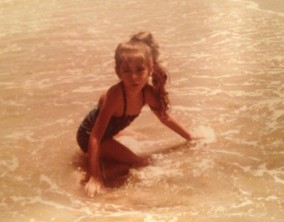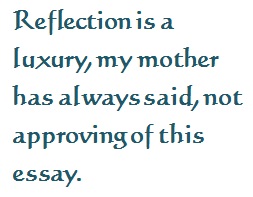
“Anthropophagi. Absorption of the sacred enemy. In order to transform into totem.”
— Revistia of Antropofagia, Oswald de Andrade
There is no heritage, only ethnography.
*
If nothing else, seasons are salvation. Yet I was forged in a seasonless climate.
I wasn’t an intention. They had lost a girl two years before that summer, when my parents lived in my Aunt Nena’s house on the U.S.-Mexican border. That summer all sorts of things creeping into my aunt’s home: scorpions, indigo snakes, toads, tarantulas. A summer of my mother veiling her eyes from the sun in salt marshes. Her period was a week late when an armadillo, full-armored, bony-plated, swam towards her where she waded in shallow waters.
I want to hear more, where was my father, if she touched the armadillo, was it an omen after all, what they had named their almost-daughter.
I don’t remember, she shrugs, her elbow deep in a sink of water hot enough to burn anyone else, and it doesn’t mean anything. Stop looking for symbolism. Trust only what gives it to you straight.
*
As a child I am convinced there is a whole other world hiding in my father’s languages. For years I study, tear apart and search for this world in Biblical and Modern Hebrew, in the Torah, in the commentaries of great men. My father insists on equality. You are raising her like your son, a rabbi comments, and that fact of my lacking, my biology, never leaves me.
I learn early that I’m limited from the start. I will never be a high priest. I am forbidden to speak the most sacred of names. Soon we switched synagogues. Because I was born female.
*
It does not begin there. It begins with my mother Esperanza, a Mexican, a Catholic, poor, second mother to a family of 9. Esperanza is a hard woman and terribly practical; at seven I fall very ill with a high fever, and she sends me to school. When I’m sent home, she takes me back.
*
It doesn’t begin there. It begins with her conversion to Judaism before I was born. It begins with my father Yakov losing most of his family when he married her.
She becomes Espie, and he becomes Jack. They attempt new accents and dress styles. They travel all over the Southwest and Mexico. My father shaves his beard, keeps his mustache, and is delighted when others speak Spanish to him.
Your father wanted to be a vaquero all along, my mother says, but not necessarily Mexican. A cowboy in an ideal, universal sense. He wanted love, honor and sweeping countryside. Yet he cannot completely leave behind his old self. He still prays every Friday night, says Kaddish for his parents. His old self appears, the minor cords stripping him of all new adornments. It moves my mother, and she welcomes these moments, the moments that lived before he knew her. This, she says, is part of why I converted.
*
It does not begin there. It begins when I ask my father about his past, and he says he is a man from nowhere. My mother’s family is large and spread out along the U.S.-Mexican border from Chula Vista to Brownsville. In each of their homes has been a space for us, a space too for this man from nowhere.
Within my father, there is no heritage, only confession to my mother, his priestess who offers not forgiveness but devotion, even when he falls silent again for years at a time.
*
Reflection is a luxury, my mother has always said, not approving of this essay.
Your father is a man who does, she over a bad connection, and we don’t talk about it. She is tired and cranky from a long day testing students’ Spanish skills at an elementary school. She is soaking her feet in a small tub that my father fills with Epson salts, and waits until he leaves for his shift at Pep Boys. She always calls when he has the evening shift. She wants to talk after all. She has decided that there are things someone should remember.
*
Only after I was a teenager did I learn about my father’s father Benyamin. This man was already a grandfather when he married my father’s mother, my grandmother Lee, his third wife. My father was born to watch his father die for years in a hospital. After Benyamin’s death, very few family members attended the funeral, to spite his new family. My father, raised by a single mother, poor, isolated. It ends there, for now.
My father’s father left my father only a quote from the Talmud: Eternity means Jerusalem. He did not explain. He didn’t have time.
*
My maternal grandfather Julian, my abuelo, was a second father to me. Abuelo was my man of lank, my first beloved, a fisherman who taught me to swim in the Gulf of Mexico by throwing me in the water off a boat without warning. It was the first test of love I’d ever know, the first heartbreak, the first reconciliation all rolled up into one sunburnt, watery-eared day.
*
In her youth, my mother won a beauty pageant in the Rio Grande Valley. She was crowned and photographed. But the newspapers would not run her photo. Because she was Mexican. She is telling me this now, over the bad connection. She has told me many times.
*
I have inherited my parents’ feeling of being in free fall. In college I turn down medicine and business in favor of poetry. I have no safety net. At 18 I am expected to contribute to the family income. I send some of my scholarship money home. My mother mails the checks back.
*
My grandfather broke the world down for me: there are dolphins, the divine whose charms and intelligence hide their violence; the sharks, those apex climbers who have exceeded evolution, and the whales, the unknown we should leave alone. Which are we, I’d asked. We are the sharks, he said. Even your quiet, gentle, forgiving father.
*
Though it is harder to see them, distance-wise, my father’s family in Israel is more accepting of us. This family has seen combat. Some of my cousins, after completing their service in Israel, wash up on the shores of Goa. They want something more of all that is less. Something quiet. They mistake, at times, my father’s silence for inner peace.
*
In 2002, I move to Har Hatsofim, an Israeli enclave in Arab East Jerusalem. I was in love with an Arab Christian woman. My mother would not talk to me during those years. Not because of homophobia. But because my mixed status had already complicated matters enough. Why bring sexual preference into it, she asked, thinking practically.
*
In failed reconciliation, I write in “Levantine” for my ethnicity for a fellowship at Hebrew University. I cannot stop claiming space. I gouge out a hermit crab, bury myself in caliche. Those are the days I’d tell Nazim Hikmet: If I do this, then I won’t have to plant trees.
*
My cultures are endless civil war. Cartels carving up turf. I tear myself up to speak. I’m not talking about only civil war. The warring turf is within me.
*
I come from a long line of apex climbers. I hit puberty late, and in high school, we are shown a film about the female blue shark, who pushes down her womb to shallow ground during mating season. She is almost unmovable. Her skin is thicker than the males. I will be deterred. I will not submit. I will fight rather than die.
*
I had my first taste of whiskey in my abuelo’s boat. I’d just eaten a raw clam.
I remember it quivering in a clear plastic dish, cracked on the bottom. The clam bled passing between us. You could die, my abuelo said, in lesser hands; don’t ever trust anyone like this. It was my first raw flesh. I wanted to tear it to bits. I wanted it to scream and beg. I chewed until my own lips bled. Here, he said: drink a little of this; it kills the bad stuff. He gave me a drop or two, and I tasted all the salt and ethanol and spit and morning cigarettes of him. I’m dying, he said, as the sun blazed over us, my mouth dry, my throat tight. Do you know what death is?
No, I whispered.
Death is the ocean, he said.
This is what abuelo left me. He did not explain. He didn’t have time.
Born to a Mexican mother and Jewish father, Rosebud Ben-Oni is a 2013 Canto Mundo Fellow and the author of SOLECISM (Virtual Artists Collective, 2013). A Leopold Schepp Scholar at New York University, she won the Seth Barkas Prize for Best Short Story and The Thomas Wolfe/Phi Beta Kappa Prize for Best Poetry Collection. She was a Rackham Merit Fellow at the University of Michigan where she earned her MFA in Poetry, and was a Horace Goldsmith Scholar at the Hebrew University of Jerusalem. Recently, her story “A Way out of the Colonia” won the Editor’s Prize for Best Short Story in Camera Obscura: A Journal of Contemporary Literature and Photography. A graduate of the 2010 Women’s Work Lab at New Perspectives Theater, her plays have been produced in New York City, Washington DC and Toronto. Her work appears in The American Poetry Review, Arts & Letters, Bayou, Puerto del Sol, among others. Rosebud is an Editorial Advisor for VIDA: Women in Literary Arts (vidaweb.org). Find out more about her a t7TrainLove.org


This is absolutely, incredible….fantastic piece……wonderful………the listing, the restraint of voice, the tension of saying only enough to say so much….exquisite.
Thank you so much, Marian!
You are ever so welcome. I loved it.
Congrats, Rosebud. Fantastic!!
This is fantastic Rosebud! Simply fantastic!
Loved this rb: “I gouge out a hermit crab, bury myself in caliche. Those are the days I’d tell Nazim Hikmet: If I do this, then I won’t have to plant trees.”
Thank you!
Our pleasure, Rosebud!